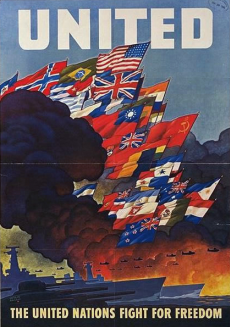
Korea had fallen under Japanese Imperial rule prior to the Second World War, therefore when Japan was defeated the allied forces fighting in the pacific (chiefly the US and USSR) established a claim upon it. The US first made the proposal to divide Korea along the 38th parallel in 1945, separating many families and village communities in the process, thus immediately creating resentment and tensions across the newfound border. As a Korean in exile wrote in 1943, ‘When the ancestors of northern Europe were wandering in the forests, clad in skins and practicing rites, Koreans had a government of their own and attained a high degree of civilization”. Indeed Korea had been a united nation for over 1000 years with united culture, language and government. The ideological boundary of the 38th parallel created between the US and USSR divided a stable nation, effectively using Korea simply as a proxy in their fight for supremacy post WWII. A Korean resistance arose almost immediately post WWII calling itself the Korean People’s Republic and spread throughout the entire Peninsula. The USSR allowed this resistance to dictate government in the north but the US put down the nationalist resistance in the South of Korea as they wished to control the Government. However the focus here is not on the US but upon the United Nations’ failure to act impartially and democratically. Giving dual control of a nation to two world superpowers with opposing ideologies was logically inept and the United Nations may therefore be brought to blame for doing so. One must consider that, because of the UN’s symbolism as a world peace organisation, it has a duty to support only morally correct situations. By allowing the division of Korea and US suppression of the nationalist resistance it not only undermines the UN’s principles but also creates a negative image of the Korean people to global Medias.
From an external perspective, if the United Nations were supporting the control of Korea then it creates an image of Koreans as a barbaric people who need controlling; parallels may certainly be drawn to the media’s presentation of the Middle East today, justifying western involvement as controllers or saviours when in fact the reality is far less altruistic. Indeed as Stone notes, it was unwise for a neutral body [such as the UN] made up of multiple nations to take sides in a dispute between the US and USSR. Therefore, by allowing this image of Korea to spread the UN played a large role in alienating the nation from the rest of the world, unless of course it was ‘moderated’ by the United States who were offering Marshall aid to post war Europe and enhancing their moral image. Ergo the North were abandoned to Soviet rule and the division between them and their Southern brethren grew to be as different as the US and USSR, so it is no surprise that the division has become so extreme in today’s world, fuelled by years of resentment and ideological indoctrination between East and West.

0 Comment:
Be the first one to comment on this article.